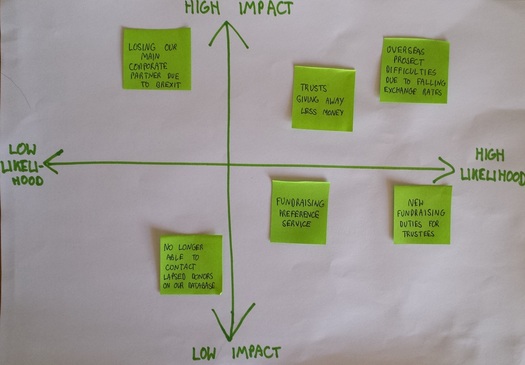|
Just when many charities were wondering how things could get any worse, along came the decision to leave the EU. There were already plenty of worries to keep people up at night. Sustained media scrutiny of fundraising practice and charity governance. A disillusioned public with decreasing trust in the sector. The need to get to grips with new fundraising responsibilities for trustees and a new Fundraising Regulator. Further clouds on the horizon in the form of the much-discussed Fundraising Preference Service and incoming EU Data Protection law. Brexit has now added a load more challenges into the mix. It's confirmed a growing belief that the values of many charities are out of step with a large part of the general public, and emphasised the need to win back public trust. Another financial crisis would mean that your beneficiaries need you more than ever but funding would be harder still to find. The huge uncertainty may make many trusts, corporates and high net worth individuals more reluctant to hand over money in the short term at least. Are you feeling depressed yet? Believe it or not, the aim of this blog is to make you feel more confident and positive about these challenges so bear with us for a bit longer! The sheer volume of bad news for charities recently can make it tricky to absorb everything, understand how it impacts your organisation and decide what to do next. Every day brings new articles and concerns. But if you can cut through the noise and work out how to identify what really matters to you and what you can do about it, you can feel a lot more confident about the future. Last month we ran a workshop at JustGiving about how to future-proof your fundraising efforts in the current climate. We worked with a range of small charities to explore the biggest current challenges are and how to move forward. A big part of this focused on what tools you can use to understand the impact of external factors on your charity and plan for the future. Here are four great tools for future-proofing your fundraising in the current climate: 1. Horizon scanning There's a big difference between being broadly aware of the challenges facing the charity sector and being able to decide and prioritise what's most relevant to your charity. Doing a horizon scanning exercise is a great first step. Start by brainstorming a list of all the different possible issues and trends that you're aware of. Be as specific as possible – for instance don't write 'Brexit' but focus on individual factors like 'corporates less likely to make donations in the short term due to uncertainty'. Next, estimate the likelihood of these things actually happening and the size of the impact they would have on your charity. Plot them on a grid as follows: This is a great warm-up exercise to get your staff and trustees thinking more clearly about things and prioritising what requires further attention, because trying to react to everything as a small team is impossible. In the graphic above, the issues in the top right quadrant are likely to be the things to discuss further, as they're most likely to happen and will have the biggest impact on your charity. 2. Play to your strengths and win back trust With public opinion in charities at an all-time low, there's a clear need for charities to win back trust and engage with their supporters as positively as possible. Many small charities have a natural advantage here, so it's important to think about how you can make the most of this. While larger charities are currently re-evaluating how they fundraise, most smaller charities that we know are in a better position because they:
Developing a public supporter promise is a great way to set out your fundraising values and demonstrate how you're different from the 'bad' charities that your supporters may have read about. This is a chance to explain how you treat donors, how you use their data and how you ensure that any other organisations that you work with uphold your high standards. Here’s a great supporter promise developed by Mind. By all means look at supporter promises developed by other charities for inspiration but it's important to avoid just copying them. You need to decide what values are important to you and how you're going to work behind the scenes to honour your promise. This may require you to review your training, induction and administrative processes. When your promise is finished, publish it prominently on your website and make all your supporters aware of it by shouting about it in your newsletter, emails and on social media. 3. Review your organisational culture and governance The Board of Trustees plays such an important role in defining a charity’s approach to fundraising, especially in smaller charities. The Board must collectively understand fundraising, engage with it and care about how it's done. Together with your senior management team, trustees should now:
4. Review your fundraising strategy
We don't know exactly what the future of fundraising will look like, but we do know that now is as good a time as any to do a proper review of your fundraising strategy and evaluate whether you're setting yourself up to succeed in a changing climate. An initial horizon scanning exercise will have helped you to explore the possible impact of various issues on your fundraising activity. A strategy review will now enable you to identify where you are over-reliant on certain fundraising activities, such as individual giving, and what you can do to diversify your fundraising and reduce your vulnerability over time. Diversifying your fundraising and investing in new areas isn't easy because fundraising growth takes time. However, a strong fundraising strategy will allow you to decide where to invest resources, forecast how long it will take to achieve results and justify the business case for investing now. If you need some help with your fundraising strategy, join our mailing list to access our strategy helpsheets and look out for our upcoming workshops and webinars. We explore all these tools for change and many more in our “Fundraising in a changing climate” workshops. We're planning another one this autumn, so please get in touch with us if you’d like to find out more or provisionally reserve a place.
0 Comments
Leave a Reply. |
Like this blog? If so then please...
Categories
All
Archive
May 2024
|
Lime Green Consulting is the trading name of Lime Green Consulting & Training Ltd (registered company number 12056332)




 RSS Feed
RSS Feed